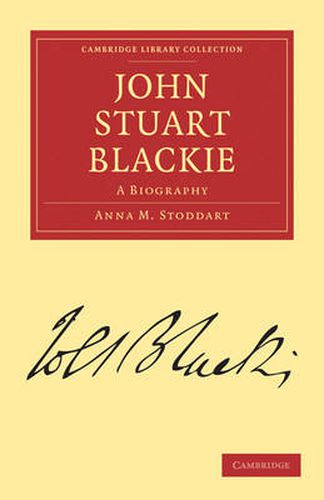Readings Newsletter
Become a Readings Member to make your shopping experience even easier.
Sign in or sign up for free!
You’re not far away from qualifying for FREE standard shipping within Australia
You’ve qualified for FREE standard shipping within Australia
The cart is loading…






John Stuart Blackie (1805-1895) trained in law and studied divinity in Scotland and Germany before becoming a professor of Classics. Confident, well-travelled, vivacious, and outspoken, he delivered numerous public lectures, was instrumental in the founding of the Gaelic Chair at Edinburgh University, and published translations of many German and Classical works, as well as an impressive body of literary criticism. He was active in Radical politics, a strong opponent of the 1867 Reform Bill, and well-known for his eccentric dress. Anna M. Stoddart’s detailed biography of Blackie, published in 1896, provides captivating insights into this extraordinary man’s life and times by drawing on letters and papers provided by Blackie’s widow and colleagues soon after his death. It remains a useful source for scholars interested in Scottish education or the experience of Scots abroad, as well as those studying nineteenth-century literature and literary criticism.
$9.00 standard shipping within Australia
FREE standard shipping within Australia for orders over $100.00
Express & International shipping calculated at checkout
John Stuart Blackie (1805-1895) trained in law and studied divinity in Scotland and Germany before becoming a professor of Classics. Confident, well-travelled, vivacious, and outspoken, he delivered numerous public lectures, was instrumental in the founding of the Gaelic Chair at Edinburgh University, and published translations of many German and Classical works, as well as an impressive body of literary criticism. He was active in Radical politics, a strong opponent of the 1867 Reform Bill, and well-known for his eccentric dress. Anna M. Stoddart’s detailed biography of Blackie, published in 1896, provides captivating insights into this extraordinary man’s life and times by drawing on letters and papers provided by Blackie’s widow and colleagues soon after his death. It remains a useful source for scholars interested in Scottish education or the experience of Scots abroad, as well as those studying nineteenth-century literature and literary criticism.